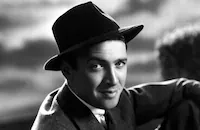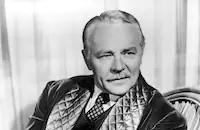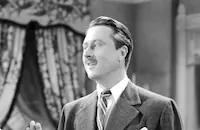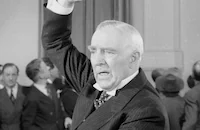No Time for Comedy

Brief Synopsis
Cast & Crew
William Keighley
James Stewart
Rosalind Russell
Charles Ruggles
Genevieve Tobin
Louise Beavers
Film Details
Technical Specs

Synopsis
Gaylord Esterbrook, a naive young playwright from Redfield, Minnesota, is summoned to New York by the producers of his play to do some rewrites. However, when producer Richard Benson's butler says no to the project, Benson withdraws his backing and star Linda Paige, who is attracted to the innocent young writer, rallies the cast to perform on a cooperative basis. On the night of the play's successful premiere, Linda proposes to Gay, thus inaugurating a successful personal and professional union. Four years and four comedies later, Gay is stumped for an idea for a new play when he meets Amanda Swift, the manhunting wife of successful financier Philo Swift. After Amanda convinces him that he has been wasting his talent on comedy and should be working on tragedy instead, Gay begins spending more and more time with his "inspiration" and less and less time with his wife. Finally, amidst recriminations, the Esterbrook marriage fails with a much publicized partner swap: Linda will marry Philo, while Gay marries Amanda. On the opening night of Gay's "masterpiece," however, the only tragedy in the theater is the audience's vehement reaction to the play, causing Amanda to hastily abandon her playwright. Meanwhile, Philo's contempt for Gay's naivete forces Linda to realize that she still loves the innocent from Minnesota, and the two are reconciled.

Director

William Keighley
Cast

James Stewart

Rosalind Russell

Charles Ruggles

Genevieve Tobin

Louise Beavers

Allyn Joslyn

Clarence Kolb
Robert Greig

J. M. Kerrigan
Lawrence Grossmith
Robert O'connor
Herbert Heywood
Frank Faylen

James Burke
Edgar Dearing

Herbert Anderson
Crew
Julius J. Epstein
Philip G. Epstein
Leo F. Forbstein
Ernie Haller
Frank Heath
Ray Heindorf
John Hughes
Stanley Jones
Robert Lord
Orry-kelly
Heinz Roemheld
Jack L. Warner
Perc Westmore

Videos
Movie Clip



Trailer
Film Details
Technical Specs

Articles
No Time For Comedy
The original production of S.N. Behrman's play had been mounted in 1939 by then-reigning Broadway diva Katharine Cornell, who had in turn imported Laurence Olivier for her leading man. In adapting the property for the screen, Julius and Philip Epstein shifted the story's focus to the male lead, and re-tailored the role to fit Stewart's persona. Broadway, in fact, provides the setting for the story itself. Opening night is imminent for the latest drawing-room farce featuring popular star Linda Paige (Russell), and producer Richard Benson (Clarence Kolb) and director Morgan Carrell (Allyn Joslyn) are getting pre-show jitters. Compounding matters is the fact that the playwright, expected in town for weeks to handle rewrites, has yet to put in an appearance.
When the author does surface, he brings them little cause for relief. Gaylord Esterbrook (Stewart), editor of a small-town Minnesota newspaper, knows nothing of New York society life beyond what he can imagine, and is almost oblivious to whatever flaws others detect in his maiden offering. Green as he is, Gay still manages to charm Linda, so much so that when Benson ultimately backs out, she encourages cast and crew to open the show on a co-op basis. Of course, the play debuts to stellar reviews, and Gay takes Linda up on her offer to extend the collaboration to marriage, a situation that brings a whole new set of problems.
The charismatic stars were served well by the Epsteins' crisp scenario, and No Time for Comedy unfolds in a stately fashion under the hand of Warners veteran director William Keighley. Able comic support was provided by Joslyn, in the sort of priggish role to which he was familiarly typed, and Charlie Ruggles, who also offered a signature characterization as Amanda's bemused stockbroker husband. Genevieve Tobin may have gone over the top occasionally with her performance as the impulsive and uncontrollable society wife. That's somewhat ironic in light of the fact that her real-life husband--Keighley--was calling the shots. It also didn't take long for waggish critics of the day to note the ironic potential of the film's title, which may help explain its alternate release as Guy With a Grin.
Producer: Robert Lord, Hal B. Wallis, Jack L. Warner
Director: William Keighley
Screenplay: S.N. Behrman (play), Julius J. Epstein, Philip G. Epstein
Cinematography: Ernest Haller
Film Editing: Owen Marks
Art Direction: John Hughes
Music: Heinz Roemheld
Cast: James Stewart (Gaylord Esterbrook), Rosalind Russell (Linda Esterbrook), Genevieve Tobin (Amanda Swift), Charles Ruggles (Philo Swift), Allyn Joslyn (Morgan Carrell), Clarence Kolb (Richard Benson).
BW-83m. Closed captioning.
by Jay S. Steinberg

No Time For Comedy
Quotes
Trivia
The original play by S.N. Behrman opened in Indianapolis, Indiana, USA, on 31 March 1939.
Notes
The working title of this film was Guy with a Grin. According to a news item in Hollywood Reporter, Casey Robinson was originally assigned to write the screenplay as a vehicle for Bette Davis. A later news item in Hollywood Reporter notes that Marlene Dietrich was to star with James Stewart.















